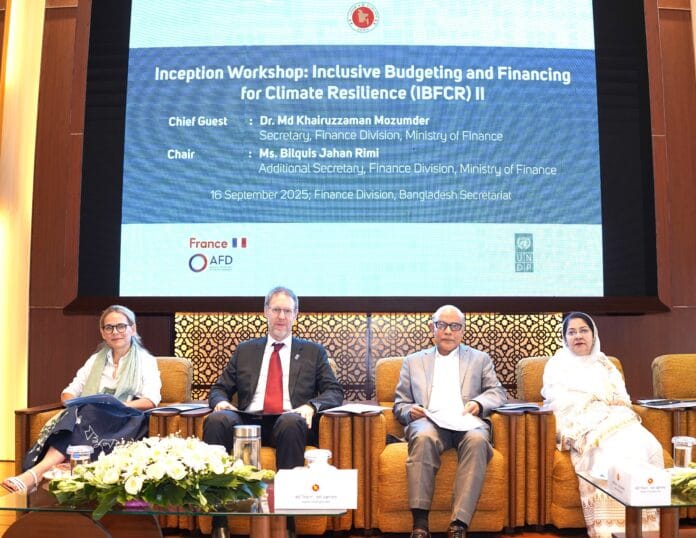Bangladesh has strengthened its climate resilience efforts with the launch of the second phase of the Inclusive Budgeting and Financing for Climate Resilience (IBFCR) program, aimed at addressing the devastating impacts of climate change that currently cost the country nearly $1 billion annually.
The program was officially unveiled at a ceremony at the Finance Division in Dhaka today.
At the event, officials highlighted that global temperatures reached a record 1.55°C above pre-industrial levels in 2024, intensifying climate threats for Bangladesh, one of the world’s most vulnerable countries despite contributing less than 0.56 percent of global greenhouse gas emissions.
Tropical cyclones alone destroy 0.7 percent of the country’s GDP each year, while agricultural output in the southern belt is projected to shrink by 18 percent by 2040.
According to the World Bank, climate-induced migration could displace 13.3 million Bangladeshis by 2050.
To address an estimated annual climate finance gap of $12.5 billion, or 3 percent of GDP, the Finance Division, in collaboration with UNDP and with support from the Agence Française de Développement (AFD), launched IBFCR Phase II.
Finance Division Secretary Dr. Md. Khairuzzaman Mozumder attended the inaugural session as chief guest, while Additional Secretary Bilquis Jahan Rimi chaired the event.
UNDP Resident Representative Stefan Liller and AFD Deputy Country Director Cecilia Cortese attended as special guests. Joint Secretary Md. Nazrul Islam delivered the welcome address, and Joint Secretary Md. Muhammad Abul Kasem gave the vote of thanks.
Speaking at the event, Dr. Mozumder said, “Although Bangladesh contributes very little to global emissions, we remain one of the most climate-vulnerable countries, bearing the consequences of actions by others. We are fully committed to adaptation programs and mitigation measures. The second phase of IBFCR will advance our efforts to build resilience for our people and economy.”
He added that the Climate Change Action Plan, revised last year, serves as a roadmap to guide these efforts and ensure effective resource mobilisation.
Additional Secretary Bilquis Jahan Rimi emphasized the importance of coordination across ministries, stating, “By enhancing cooperation and institutional capacity, we can ensure that climate priorities are fully integrated into our public financial management system.”
UNDP Resident Representative Stefan Liller said, “IBFCR-II aims to embed climate priorities into public finance, ensuring every taka spent delivers real results for people. Climate change is already shaping lives and livelihoods in Bangladesh.” Cecilia Cortese of AFD added, “IBFCR-II provides technical support that complements a €300 million policy-based loan program dedicated to supporting the government’s climate strategies and plans.”
During the technical session, UNDP Program Specialist Dr. Maliha Muzammil presented the roadmap for IBFCR Phase II. Expert discussants included PKSF Deputy Managing Director Dr. Fazle Rabbi Sadeque Ahmed and CPD Executive Director Dr. Fahmida Khatun. A panel discussion on “Climate-Informed Public Finance Management in Bangladesh” was moderated by Additional Secretary Dr. Ziaul Abedin, with panelists from key ministries and UNDP.
IBFCR Phase II will build on lessons from the first phase by updating the Climate Fiscal Framework, strengthening climate finance tracking, and formulating a National Climate Finance Strategy. The program will also promote tools like the Local Adaptation Plan of Action (LAPA) and Climate Vulnerability Index (CVI) to ensure financing reaches frontline communities.
Officials stressed that the initiative will improve transparency, accountability, and coordination across ministries while aligning Bangladesh’s budgetary system with the Paris Agreement, Sustainable Development Goals, and the country’s National Adaptation Plan (NAP) and Nationally Determined Contributions (NDC).
By embedding climate resilience into public finance, Bangladesh aims to safeguard development gains and protect citizens from escalating climate risks.

